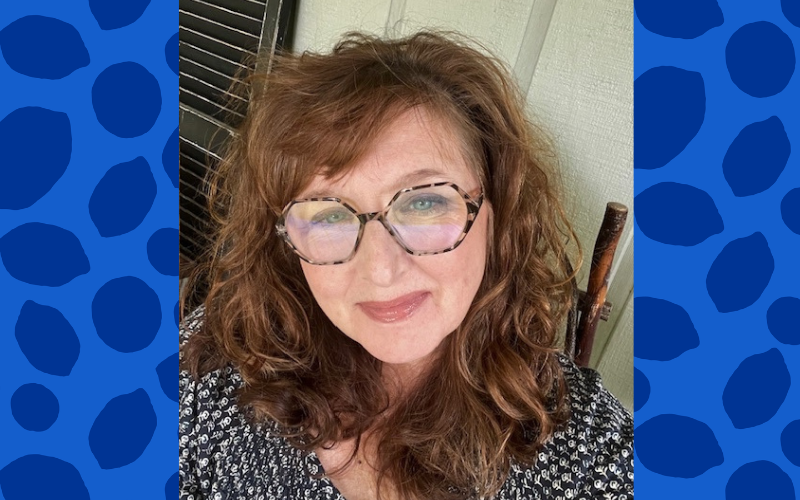
By: Trish Adkins
There were two things that Robin Dobbins said she’d never do as a nurse: work in oncology and work with kids.
“God must have a sense of humor,” said Robin, who has now worked exclusively in both oncology and pediatrics for the past nine years at the Georgia Cancer Center at Augusta University. Robin is an oncology research nurse in the Pediatric Immunotherapy Program, where she works to keep three clinical trials moving along, supporting both the science and the kids who enroll. The trials are led by Dr. Ted Johnson, an Alex’s Lemonade Stand Foundation- funded researcher who studies immunotherapy as a promising treatment for kids with relapsed brain tumors.
Within the immunotherapy program, Robin’s official job is to make sure the trial protocol is followed, managing the timing of MRIs and other tests, ensuring medication is dispensed correctly, monitoring patients for side effects, and reporting on it all. There are currently three immunotherapy trials open in Augusta, each with strong enrollments. “There aren’t a lot of options for kids with relapsed brain tumors,” said Robin.
And while she keeps busy doing all of that official work, families who have worked with Robin mention her compassion and her love as two things that helped them get through a scary and uncertain time. “She just had a way of connecting, of always having the things to make Brynn’s time there a little more enjoyable and tolerable,” said Jessica Tobin, whose 9-year-old daughter Brynn was on the clinical trial for a relapsed brain tumor called ependymoma. Brynn was just 4 years old when she first met Robin and would always look forward to hearing stories about Robin’s chickens (Robin lives on a farm) and recalled her “sparkly eyes.”
“We walk with families through clinic through good days and bad days. These families give up so much by coming to Augusta, so we all like to give them something do other than just come to clinic,” said Robin. Robin often gives families ideas on things to do outside of the hospital, encourages them to take the vacations they have planned, and works hard to be available. The nurses on the team have patient dedicated cell phones so families don’t have to call through the hospital switchboard and can connect the trial team directly. And when it came to Brynn, Robin made sure to always have some chicken stories and pictures to share.
“We need to be a person to them,” she said. “You feel what these families go through and you just want to help.”
When Ted first came to Robin, she was working in a similar role managing adult oncology trials. Ted asked Robin and other nurse coordinators if they would help him with a new trial he was launching. No one else raised their hand, but Robin did. She agreed to help part-time and within a few months, she was working full-time with Ted and another research coordinator to enroll kids on the Phase 1 trial.
The small team worked day and night — initially enrolling 84 children. At the beginning, recalls Robin, the team realized that one of the challenges was getting kids to Augusta, Georgia. Augusta, a city that borders South Carolina in interior eastern Georgia and is best known for its famous golf course, is not super accessible for families who have to travel for treatment. The team found ways to coordinate with kids’ home hospitals and also leveraged the ALSF Travel For Care program which provides travel support to families in treatment for cancer. Over the years Travel For Care has supported the travel for more than 50 families to Augusta.
“ALSF has been a Godsend to our program. I could pick up the phone at 4:59 pm and someone would pick up and just be there to help,” said Robin. The immunotherapy program has participated in The Million Mile, ALSF’s month-long fundraising and awareness building campaign, since 2017. Their team, “Cancer Cure Crusaders” has raised close to $200,000 for childhood cancer research.
“Pediatric cancer is a rarity, until it is your kid,” said Robin
Robin, who said that she originally didn’t want to work in a healthy baby clinic, let alone with critically ill children, said that this job is it for her. She’s inspired by the kids and families who teach her so much about perseverance and what it means to live life to the fullest and how important just being a kid is, even when faced with life and death situations. She also feels a responsibility, as an adult, to help kids who are facing unimaginable diagnoses.
“I can’t imagine doing anything else as a nurse,” said Robin.
ALSF began funding Dr. Ted Johnson in 2013 with an ‘A’Award grant and leader with a Bio-Therapeutics grant. Dr. Johnson is using an immunotherapy drug called Indoximod in conjunction with chemotherapy. Phase 1 of his first trial completed in 2019 and is now in Phase 2. Robin is hopeful the trial will continue to the next Phase 3, one step closer to being available to all children with brain tumors.

